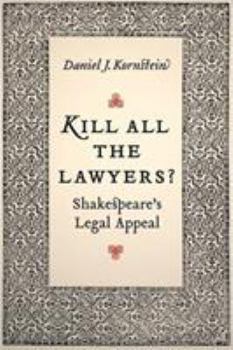Kill All the Lawyers?: Shakespeare's Legal Appeal
Select Format
Select Condition 
Book Overview
Two-thirds of Shakespeare's plays have trial scenes, and many deal specifically with lawyers, courts, judges, and points of law. Daniel Kornstein, a practicing attorney, looks at the legal issues and aspects of Shakespeare's plays and finds fascinating parallels with many legal and social questions of the present day. The Elizabethan age was as litigious as our own, and Shakespeare was very familiar with the language and procedures of the courts. Kill All the Lawyers? examines the ways in which Shakespeare used the law for dramatic effect and incorporated the passion for justice into his great tragedies and comedies and considers the modern legal relevance of his work. This is a ground-breaking study in the field of literature and the law, ambitious and suggestive of the value of both our literary and our legal inheritance. Daniel Kornstein was president of the Law and Humanities Institute and is a founding partner of the firm of Kornstein Veisz Wexler & Pollard, LLP, in New York City.
Format:Paperback
Language:English
ISBN:0803278217
ISBN13:9780803278219
Release Date:May 2005
Publisher:Bison
Length:274 Pages
Weight:0.90 lbs.
Dimensions:0.6" x 6.6" x 9.0"
Customer Reviews
2 ratings
The Wrong Lawyer
Published by Thriftbooks.com User , 25 years ago
This is an exceptional book that should be read by any serious student of Shakespeare. It provides an insightful look at Shakespeare's legal knowledge and insightful looks at how Shakespeare saw the larger issues of truth, justice, law and equity in the dramas. His analysis of the Merchant of Venice is especially pithy and noteworthy.The major fault of the book is Kornstein has the wrong man as the author. His attempts to explain how the man from Stratford acquired this deep, profound and technial legal knowledge are woefully inadequate. Kill All The Lawyers? maintains that the man from Stratford acquired his knowledge by hanging around the Courts of Law and in "Legal London" is woefully inadequate. I suppose by the same token, the author acquired his legal knowledge by hanging out in coffee shops in Harvard Square.Kornstein is aware that the legal knowledge of Shakespeare have been a long running dispute since the beginning of the Century. The case that Edward de Vere, 17th Earl of Oxford was a lawyer, sat in Parliament, sat as a juror in the trial of Mary Queen of Scots and sat as a judge in other civil matters is ignored by the Author as he seeks to avoid the entire Oxford vs. Shakspere contretemps.With this caveat aside, it is a book well worth reading.Paul Streitz Member Shakespeare Oxford Society
Kornstein's approach is original and relevant.
Published by Thriftbooks.com User , 27 years ago
Though perhaps defensive about his title and possibly a little hard on Portia, Kornstein, in true attorney style, effectively demonstrates Shakespeare's interest in and knowledge of legal problems that still are of concern today. He makes the reader aware of Shakespeare's multi-faceted view of human nature--a characteristic easily overlooked in a superficial encounter. Weakest is his theory concerning Midsummer Night's Dream, strongest is his concluding chapter with its brilliant appreciation of Shakespeare. This is an author worth knowing, a book worth reading. --Margaret Demores






